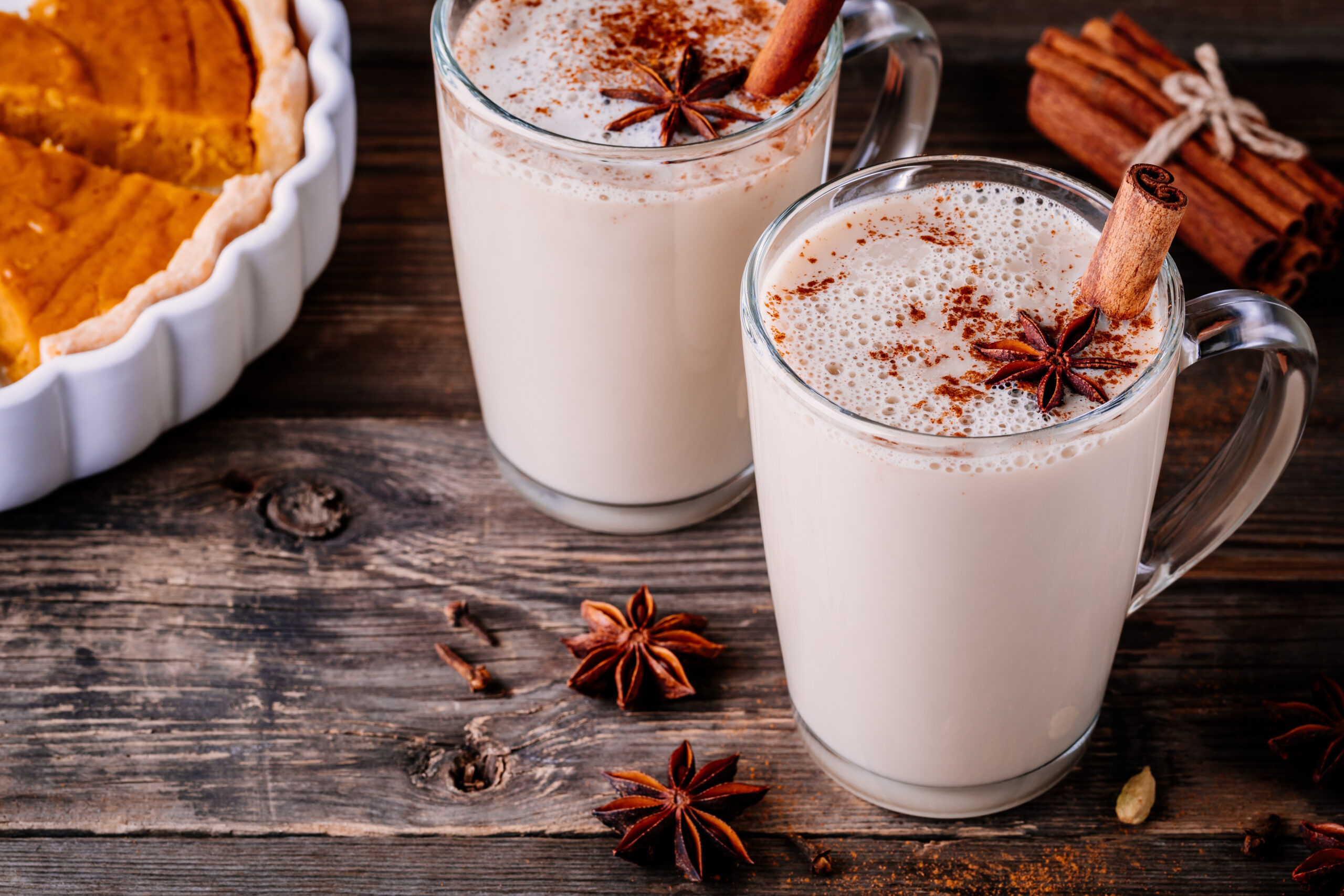
Have you noticed how the cooler evenings have you wanting to snuggle on the couch. Why not add this warming, creamy and sweet chai to cozy up on those crisp evenings.
This hot, soothing Indian tea made from a mixture of water, almond milk and spices and sugar has become a popular drink in the West. And, with good reason. The spices in this traditional tea blend warm the body and ignite the digestive fire. Feel free to omit the black tea for a caffeine free version.
Coriander is the seed of the cilantro leaf. It is small and round. This is a very balancing seed that cools and calms the GI tract. Benefits include reducing heat or acid in the stomach, decreasing congestion. Coriander also calms the digestive system and helps alleviate joint pain. It also has the quality of improving skin irritation or rashes.
Ginger is moist and dry at the same time and is known as a universal medicine benefiting everybody and all diseases. Especially good for Vata disorders, this is one of Ayurveda’s best go-to spices. When using ginger, think digestion, lungs and circulation.
Ginger with its pungent and sweet taste warms the digestive system, increases digestive fire (agni) and helps in the secretion of digestive enzymes. Also useful in nausea, especially travel-sickness, gas bloating and stomach gripping – it has a specific action against E. Coli and Shigella bacteria. Ginger is great when used in menstrual cramps as it regulates Vata in the lower abdomen. Despite its warm energy, it also is an anti-inflammatory. It has the properties of being able to warm and cool and is really beneficial at nourishing the reproductive system.
Ginger has a unique effect (prabhava). It’s post-digestive quality is sweet which means its long term effect is anti-inflammatory and nourishing while its initial effect is warm and stimulating for the digestion. That’s good news for anyone that has digestive and inflammatory problems.
Fennel is often placed near the exit of an Indian restaurant is a tray of small colored candy. These are coated fennel seeds. They have a sweet, almost licorice like taste. Chewing fennel seeds after a meal is a common practice in India. They aid in digestion and also freshen the breath.
Fennel may be used to decrease all three doshas: Vata, Pitta, and Kapha. It has a sweet, slightly astringent, and bitter taste, or rasa. It is cooling and its after-taste or vipak is sweet. Fennel is used as a digestive tonic, a mild laxative, and a diuretic. It also helps remove toxins from the body.
As a diuretic, and a urinary alkaline, fennel helps remove toxic substances from the body and assists in reducing rheumatism and swelling. Certain constituents of the essential oils in fennel are stimulants and they promote the secretion of digestive and gastric juices, reduce inflammation of the stomach and intestines, and aid in the proper absorption of nutrients from food.
This spice has anti-acidic and anti-spasmodic properties as well; it relieves intestinal spasms or cramps.Due to its fragrant smell, fennel is commonly used worldwide in toothpastes, breath fresheners, antacids, desserts, and in a variety of culinary creations.
With fennel you get a lot for a little seeds. The iron, phosphorous, calcium, magnesium, manganese, zinc, and vitamin K content present in fennel all contribute to building and maintaining bone structure and strength. Phosphate and calcium are both important in bone structure. Iron and zinc are crucial for the production and maturation of collagen. Maintaining a low sodium intake is essential for lowering blood pressure, but increasing potassium intake may be just as important because of its role in vasodilation, the dilation and contraction of blood vessels. According to the National Health and Nutrition Examination Survey (NHANES), fewer than 2 percent of American adults meet the daily 4,700 mg recommendation for potassium.In addition, there is evidence that potassium, calcium, and magnesium decrease blood pressure naturally. All of these are present in fennel.
Dietary nitrates present in fennel and other foods have vasodilatory and vasoprotective properties. Because of this, they helps to lower blood pressure and protect the heart. Fennel’s fiber, potassium, folate, vitamin C, vitamin B-6, and phytonutrient content, coupled with its lack of cholesterol, all support heart health.Fennel contains significant amounts of fiber. As fiber helps lower the total amount of cholesterol in the blood, it decreases the risk of heart disease.
Selenium is a mineral that occurs in fennel, but not in most fruits and vegetables. It contributes to liver enzyme function and helps detoxify some cancer-causing compounds in the body. Selenium can also prevent inflammation and decrease tumor growth rates. Fennel contains folate, which plays a role in DNA synthesis and repair. This may help prevent cancer cells from forming because of mutations in the DNA. The selenium found in fennel appears to stimulate production of killer T-cells. This suggests that it can improve the immune response to infection.
Ginger contains Gingerol, a substance with powerful medicinal properties. It has been used to help digestion, reduce nausea and help fight the flu and common cold, to name a few. Ginger appears to be highly effective against nausea. relieving nausea and vomiting after surgery, and in cancer patients undergoing chemotherapy. But it may be the most effective when it comes to pregnancy-related nausea, such as morning sickness.
Ginger has been shown to be effective against exercise-induced muscle pain. In one study, consuming 2 grams of ginger per day, for 11 days, significantly reduced muscle pain in people performing elbow exercises. Ginger does not have an immediate impact, but may be effective at reducing the day-to-day progression of muscle pain. These effects are believed to be mediated by the anti-inflammatory properties.
Osteoarthritis is a common health problem that involves degeneration of the joints in the body, leading to symptoms like joint pain and stiffness. Interestingly in a controlled trial of 247 people with osteoarthritis of the knee, those who took ginger extract had less pain and required less pain medication. Another study found that a combination of ginger, cinnamon and sesame oil, can reduce pain and stiffness in osteoarthritis patients when applied topically.
Just to note this remedy is often given as an ayurvedic remedy for Vata type arthritis. Ginger has been shown to lower blood sugar levels and improve various heart disease risk factors in patients with type 2 diabetes.
CHAI – WITH ALMOND MILK
Bring the water to a rolling boil in a large saucepan over high heat.
Crush the coriander seeds using a mortar and pestle. Add the ginger, fennel seeds, cardamom pods, black tea, crushed coriander seeds, cloves, star anise, and cinnamon. Reduce the heat to low and simmer gently for 10 minutes.
Pour the mixture through a strainer over a bowl. Leave the tea to cool for a few minutes before stirring in the almond milk and honey or stevia to taste.
Want more meals that are not only good but good for you?! Take the Modern Dosha Quiz to discover your dosha and receive health, diet and lifestyle recommendations based upon your answers!
In health,


The Holistic HIghway integrates traditional Western medical practices with Ayurveda medicine, creating a focus on prevention through nutrition, diet, and exercise; use of the latest genetic testing and other diagnostic techniques; and prescribed combinations of botanical medicines, supplements, therapeutic diets, detoxification programs, or stress-management techniques.

Integrative Health Expert | Ayurveda Practitioner | Author | Speaker
Kerry is a globally recognized leader in integrative medicine and the science of health known as Ayurveda. She is passionate about raising awareness of the need for a change in contemporary medicine that focuses on patient empowerment and a health-based (rather than disease-based) medical system.
Kerry is connected with The University of Pittsburgh Center for Integrative Medicine and remains a pioneer in the field of integrative medicine where she has developed a personalized system to manage chronic disorders by incorporating fundamental changes in diet, behavior, and stress while focusing on genetics.
This individualized program is so successful that many of her clients have achieved maximum healing and vitality after years of chronic problems!
More to Explore